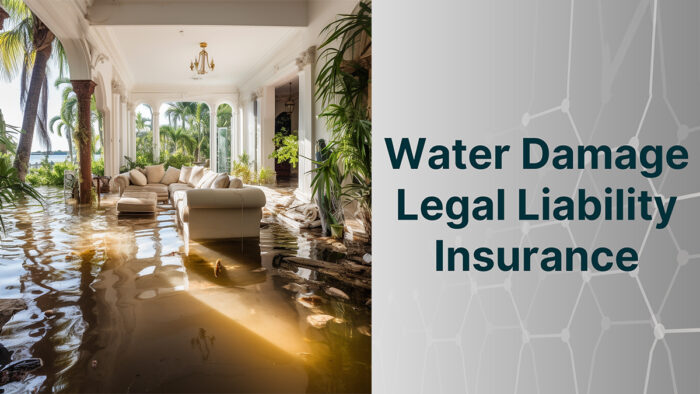Water damage legal liability insurance is a form of coverage that safeguards property owners and tenants from financial losses. This incident is due to claims related to water damage and alleged ignorance.

Generally, this insurance covers water damage incidents such as overflow, backup, mold, and mildew and legal expenses linked to lawsuits related to water damage. Moreover, it’s important to know the basics of managing risk for homes and business properties, which offers financial security in cases of water-related incidents.
Individuals usually find coverage for water damage legal liability insurance with its costs, including their tenants, homeowners, and condo policies.
How Water Damage Legal Liability Insurance Works
Water damage legal liability insurance is related to liability insurance. Liability insurance is a form of protection that safeguards people or businesses from lawsuits or responsibility for certain incidents.
Additionally, it provides coverage for legal expenses and compensation for any destruction or injury for which the insured is held responsible. Also, there are several events whereby water damage legal liability offers coverage for individuals from significant expenses.
For instance, second-floor condo possessors face an explosion from a water heater due to the water leakage into units on the first floor. However, water damage legal liability insurance provides funds to repair the damage to the first-floor units.
Without such insurance, the second-floor condo owners might find themselves liable for the entire repair expenses.
Types of Water Damage Legal Liability Insurance
There are five forms of water damage legal liability insurance that specifically help in providing coverage against water damage incidents.
• Commercial General Liability (CGL) Coverage
CGL coverage safeguards businesses from water damage claims arising from their day-to-day operations. This insurance is important for businesses that secure or own business property, covering them against potential financial losses. This results from water-related incidents like leaks, burst pipes, or other water-related mishaps.
• Business Owners Policy (BOP) Coverage
A Business Owners Policy (BOP) is a policy package used for small to medium-sized businesses that merges property and liability coverage.
Additionally, water damage liability coverage may be added within the liability section of the BOP. This helps to extend coverage against claims arising from water-related issues during commercial activities.
• Commercial Property Insurance Coverage
Commercial property insurance policies also offer water damage liability coverage as an alternative to endorsement. However, it’s crucial for commercial property owners to offer coverage against water damage claims filed by tenants or other external parties.
• Homeowners Insurance Coverage
Homeowners insurance commonly incorporates coverage for water damage liability coverage as a standard feature. This coverage protects homeowners from significant claims created by water damage due to their alleged negligence, such as inadequate property maintenance.
• Renters Insurance Coverage
Renters insurance policies usually add water damage liability coverage to their liability coverage. This form of insurance is important for renters to present coverage against claims filed by landlords or other third parties for water damage.
Factors Affecting Water Damage Legal Liability Insurance Premium
Factors influencing water damage liability coverage premiums are highlighted below:
• Property Location
The location of a property helps in determining the premiums for water damage legal liability insurance. Properties found in high-risk places, such as those close to water bodies or records of constant water damage claims, have higher premiums.
• Age and Condition of Property
The age and condition of a property are additional factors affecting insurance costs. Older or poorly maintained properties are more susceptible to water damage, potentially resulting in elevated premiums.
Continuous property maintenance and updates can help reduce these risks, possibly resulting in minimal insurance expenses.
• Coverage Limits and Deductibles
The coverage limits of a selected policyholder and the deductibles they choose can affect their legal liability insurance premium. However, higher coverage limits and minimal deductibles simply result in higher premiums, but minimal coverage limits and higher deductibles may result in minimal premiums.
• Claims History
The policyholder’s claim history has a significant influence on insurance premiums. A record history of constant claims or a pattern of water damage events could elevate premiums, as insurers might view the policyholder as a higher risk.
• Risk Measures
There are several applications for risk measures, such as installing water leak detection systems or establishing a water damage response plan. This coverage can decrease the chance of incidents, potentially leading to lower insurance premiums.
What Water Damage Legal Liability Insurance Covers
This insurance extends coverage to people’s property, possessions, or individuals due to a sudden occurrence or mishap. Here are some of the coverages that water damage legal liability offers:
• Negligence-Related Water Damage
Water damage liability coverage generally encompasses claims arising from the policyholder’s negligence. This includes scenarios like neglecting to fix a leaking pipe or overlooking maintenance of a property’s gutter system, potentially causing water damage to adjacent properties.
• Water Backup and Overflow
Many policies incorporate coverage for water backup and overflow, instances where water escapes from sewers, drains, or sump pumps. Such coverage offers protection against claims stemming from water damage caused by these specific incidents.
• Mold and Mildew
Mold and mildew damage often follows water damage incidents, and certain policies may include coverage for mold remediation within their water damage liability coverage. Particularly crucial for property owners or managers, this coverage addresses the potential expenses and health concerns associated with mold damage.
• Legal Defense Costs
Water damage legal liability insurance typically covers the expenses of legal defense if a policyholder faces a lawsuit related to water damage claims. This encompasses attorney fees, court costs, and other expenditures linked to defending against such legal actions.
What Does It Not Cover?
In an incident where water damage results from bad maintenance, wrongdoing, or intentional negligence, liability coverage may not be applicable.
• Gradual Water Damage
Water damage legal liability insurance policies typically do not cover gradual water damage arising from slow leaks or seepage over time. Policyholders should remain aware of this exclusion and proactively address any issues related to gradual water damage.
• Flood Damage
Damage resulting from flooding is generally not covered by water damage legal liability insurance. Property owners or renters may need a separate flood insurance policy to safeguard against damages caused by floods.
• Intentional Acts
Water damage legal liability insurance excludes coverage for damage resulting from intentional acts, such as purposefully flooding a property or causing water damage to another person’s property.
• Earth Movement and Foundation Issues
Policies for water damage legal liability insurance typically do not provide coverage for water damage resulting from earth movement, such as earthquakes or landslides, or issues related to the property’s foundation, such as settling or cracking. In some instances, separate coverage may be available for these specific risks.
How to Boost Your Coverage
Not all insurance policies offer water damage liability coverage, but it is important to carefully review the insurance agreement.
A typical homeowners policy offers a fundamental liability limit of $300,000 for damages or injuries. Although this coverage can be enhanced for an extra premium, such adjustments are usually subject to.
If you consider broader liability protections beyond the ones offered by homeowners insurance, an umbrella insurance policy is a suitable option. This coverage extends to home and auto accidents, as well as incidents involving libel, slander, vandalism, or invasion of privacy.
Moreover, it caters to injuries occurring in secondary residences, seasonal homes, recreational vehicles, rental properties, or on boats and watercraft owned by the policyholder.
How to File a Claim for Water Damage Legal Liability Insurance
To file a claim for water damage under your legal liability insurance, it’s important to know that the procedure might vary based on your specific policy. However, here are some general steps you can consider:
• Reporting a Claim
In the event of a water damage incident, it is crucial for policyholders to promptly notify their insurance provider. Swift reporting facilitates a quicker claims process, ensuring that necessary repairs or remediation efforts are addressed without delay.
• Investigation and Assessment
Upon receiving a claim, the insurance provider typically initiates an investigation to assess the incident’s extent. This involves property inspections, scrutiny of maintenance records, and determination of the water damage’s cause.
• Settlement and Repairs
Based on the investigation and assessment, the insurance provider establishes an appropriate settlement amount for the claim. This may cover repair costs, remediation efforts, and any legal expenses incurred by the policyholder.
• Appealing a Claim Decision
Policyholders retaining reservations about the insurance provider’s claim decision have the option to appeal. This may involve presenting additional documentation or evidence to support their claim or collaborating with an independent claims adjuster for a reevaluation of the damages.
How to Choose the Right Water Damage Legal Liability Coverage
Choosing suitable water damage liability coverage involves evaluating your specific risks, researching various policies and providers, working with an experienced insurance agent, and reviewing the terms and conditions of the policy.
• Evaluating Your Specific Risks
Before securing water damage legal liability insurance, it’s crucial to evaluate your specific risks. This entails examining the location, age, and condition of your property, along with identifying any unique factors that may heighten the risk of water damage incidents.
• Research Various Policies and Providers
Conduct thorough research to compare various policies and insurance providers, seeking the most fitting coverage for your requirements. Consider providers known for handling claims fairly and efficiently, and weigh factors like policy inclusions, exclusions, and premium costs when evaluating coverage options.
• Working With an Experienced Insurance Agent
Engaging with an experienced insurance broker or agent proves invaluable in selecting the appropriate water damage legal liability insurance. These professionals guide you through the intricate insurance landscape, help assess your specific needs, and recommend coverage options that align with your requirements.
• Reviewing Policy Terms and Conditions
Prior to finalizing your purchase of water damage liability coverage, carefully review the policy terms and conditions. Gain a comprehensive understanding of policy inclusions, exclusions, and potential limitations to ensure the coverage aligns with your specific needs, providing ample protection.
Conclusion
Water damage legal liability insurance is a policy designed to provide coverage for individuals or businesses that cause water damage to another person’s property. This insurance can be obtained either as a separate policy or as a rider to an insurance policy, such as homeowner’s insurance.



